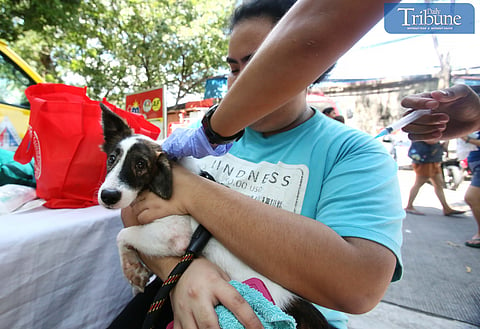
- NEWS
- the EDIT
- COMMENTARY
- BUSINESS
- LIFE
- SHOW
- ACTION
- GLOBAL GOALS
- SNAPS
- DYARYO TIRADA
- MORE

Senator Christopher "Bong" Go has called on the Department of Health (DOH) to address the nationwide shortage of rabies vaccines, highlighting the increasing number of cases and the urgent need for intervention. His appeal aligns with Palawan Governor Dennis Socrates’ ongoing efforts to eradicate rabies in the province, reinforcing the necessity of comprehensive strategies at both national and local levels.
As chairperson of the Senate Committee on Health, Go has raised concerns over the accessibility and affordability of rabies vaccines, particularly in remote areas. During a Senate hearing on 12 February, he pressed DOH officials on the availability of vaccines, citing reports from local mayors about supply gaps.
"How is the DOH addressing this? Paano ba ma-access itong rabies vaccine? May free rabies vaccine ba na available sa DOH at LGUs? (How is the DOH addressing this? How can people access the rabies vaccine? Is there a free rabies vaccine available from the DOH and LGUs?)," Go asked.
The surge in rabies cases is alarming, with a 23 percent increase recorded from January to September 2024, totaling 354 infections nationwide. Davao alone saw 36 deaths in 2023 — a 50 percent rise from the previous year. Despite the availability of post-exposure prophylaxis (PEP), supply shortages and lack of awareness continue to hinder effective rabies control.
Senator Raffy Tulfo echoed Go’s concerns, comparing rabies fatalities to cobra bites and stressing the need for urgent government action. The Research Institute for Tropical Medicine (RITM) confirmed that free vaccines are available at their facilities, but local health centers still face supply challenges.
DOH Undersecretary Emmie Liza Perez-Chiong acknowledged the shortage, revealing that last year’s 330 vials had already been exhausted. She assured lawmakers that 2.7 million doses were being procured, with deliveries expected within 30 to 45 days.
Go urged the DOH to ensure a concrete distribution plan, emphasizing the importance of collaboration with local government units (LGUs) to protect vulnerable communities from the deadly disease.
In Palawan, rabies remains a pressing public health issue, with an estimated 90,000 animals, including thousands of stray dogs and cats, posing a continued risk.
Governor Dennis Socrates has been at the forefront of rabies control efforts, advocating for stricter local ordinances and large-scale vaccination campaigns.
"I'm sure all towns in Palawan have ordinances prohibiting stray dogs; they should have a city pound," Socrates told the DAILY TRIBUNE in an interview.
While all island municipalities in Palawan have been declared rabies-free, mainland areas continue to report cases, particularly in the southern regions, where at least three cases per municipality are recorded annually.
Socrates emphasized the provincial government’s role in supporting municipal efforts, ensuring that gaps in rabies control are addressed effectively.
"The governor has more of a supervisory role over the mayors. In a subsidiary capacity, whatever the municipality cannot accomplish, theoretically, the province steps in — especially for intermunicipal roads," he explained in an interview with the DAILY TRIBUNE.
With both national and provincial leaders pushing for stronger rabies control, the call for adequate vaccine supply and stricter local implementation has gained momentum.
As Go continues to demand accountability from the DOH, Socrates’ on-ground initiatives in Palawan serve as a model for other provinces facing similar challenges.
